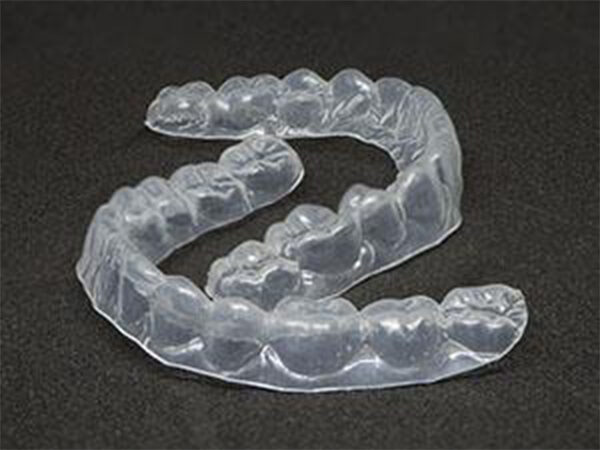Protect your teeth from injury
Night Guard (Bruxism) (Teeth Grinding)
What is Night Guard?
Many individuals are unaware that they grind or clench their teeth at night, but a lot of damage can occur. Symptoms associated with teeth grinding include headaches, ear aches, facial and neck muscle pain, and jaw joint pain.
Night guard provide protection against teeth grinding (bruxism) & clenching during sleep. They help to reduce enamel damage, jaw joint inflammation, and irritation to gums. The night guard fits over either the upper or the lower teeth, creating a cushion between them and absorbing the impact of grinding or clenching.

What is Bruxism?
Bruxism is the excessive grinding of the teeth or excessive clenching of the jaw. It is an oral para-functional activity i.e., it is unrelated to normal function such as eating or talking.
What are the causes of Bruxism?
There are many things that may cause bruxism. It may be the way your body responds to stress or an injury. Experts believe bruxism is caused by a combination of physical, psychological, and genetic factors. Most common reasons are –
- Sleep disorders: studies have shown that disturbances in sleep are a factor in bruxism.
- Lifestyle:findings show that smoking, caffeine intake, and excessive use of alcohol contribute to it.
- Stress:there is no doubt that stress, depression, and anxiety are major contributors to bruxism.
- Physical ailments:stress, anxiety, and depression are often a significant part of a physical ailment because they share the same causal elements as psychological factors.
What are the Types of Bruxism?
There are two types of bruxism. They are awake and sleep bruxism.
Awake bruxism – bruxism that happens while you’re awake (day time), might be triggered by anxiety, stress, anger, frustration, or tension.
Sleep bruxism – bruxism that occurs at night, might be caused by similar triggers as awake bruxism. It may also be an unconscious habit your body has while you sleep.
What are the common symptoms of Bruxism?
Bruxism sometimes may cause minimal symptoms, and therefore people may not be aware of the condition. Patients may also experience some of the following symptoms:
- Clenching your teeth along with noisy grinding that’s loud enough to wake up your sleep partner.
- Increased tooth pain and sensitivity to cold, hot, or sweet foods.
- Chipped, flattened, or fractured teeth and dental restorations, such as crowns and fillings.
- The chewing surface of your teeth look yellow because the enamel has been completely ground away, exposing the softer, yellow layer called dentin.
- Soreness or ulcers from chewing on the inside of your cheek.
- Tooth marks on your tongue.
- Aching jaw and neck muscles.
- Frequent headache that starts at the temple area.
- Unable to get a good night’s sleep.
This is just a list of the most common symptoms you may experience if you have bruxism. Talk to your dentist if you’re experiencing any of the above. They’ll help determine if you have bruxism or something else.
What is the treatment for Bruxism?
In mild cases, treatment may not be necessary. However, if the problem is frequent and severe, there are many treatment options you can explore to get some relief.
- Depending on your case, your dentist may adjust your bite and recommend a night guard (soft) to keep your teeth separated while you sleep and avoid damage caused by teeth grinding and clenching.
- Get a sleep study done- this is the only reliable way to determine if you have sleep disorder.
- Quit smoking, reach for the decaffeinated coffee.
- Talk to a counselor if you are really stressed out, anxious, or depressed.
At life care dental clinic mysore, we provide custom-made night guards for adults and children. It typically takes two appointments to receive a night guard. During the initial visit, our specialist makes an impression of the teeth, together with a bite record. These will be used to create a customised guard in the lab that allows for proper teeth alignment. During the second appointment, night guard will be given to the patient. Having a professional custom-made night guard ensures proper fit and alignment to the shape of your mouth and teeth, giving you the best protection!
FAQ's on Teeth Grinding & Night Guard
Long-term bruxism can also erode the chewing surfaces of your teeth, causing them to become dull.
In severe cases, bruxism may lead to fractured or chipped teeth and even permanent tooth loss.

